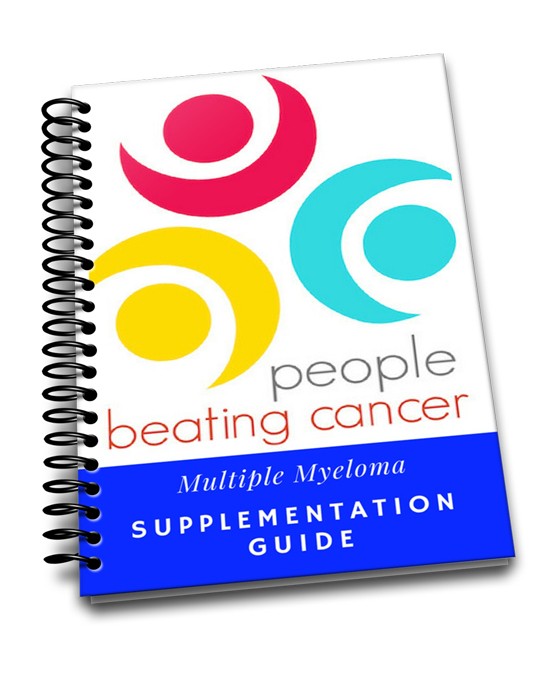
Recently Diagnosed or Relapsed? Stop Looking For a Miracle Cure, and Use Evidence-Based Therapies To Enhance Your Treatment and Prolong Your Remission
Multiple Myeloma an incurable disease, but I have spent the last 25 years in remission using a blend of conventional oncology and evidence-based nutrition, supplementation, and lifestyle therapies from peer-reviewed studies that your oncologist probably hasn't told you about.
Click the orange button to the right to learn more about what you can start doing today.
- You are here:
- Home »
- Blog »
- Healthy Living Products »
- Early Stage Multiple Myeloma Diagnosis- Resveratrol? Pre-Habilitation?
Early Stage Multiple Myeloma Diagnosis- Resveratrol? Pre-Habilitation?

“ Resveratrol inhibits the proliferation of MM cells by inducing apoptotic cell death. Resveratrol also inhibits MM cell invasion. The inhibition of invasion may be associated with…”
Multiple Myeloma Therapy- Resveratrol
My questions are:
- is it the type and dose of resveratrol that matters?
- And–what about the brand or maker of the supplement?
Hi N K.-
- 200mg of trans resveratrol- yes, resveratrol has been shown to by cytotoxic to MM and can enhance the efficacy of Velcade. See the study linked below.
- 100mg of quercetin- also shown to be cytotoxic to MM and enhance dexamethasone.
- 25mg of blueberry extract- shown to be good for my brain…
- MM Survivor
- MM Coach
- Director PeopleBeatingCancer
Recommended Reading:
- Multiple Myeloma Survival- Detox, Whole-Body Hyperthermia
- SMM Becoming Multiple Myeloma Diagnosis?
- Multiple Myeloma Diet- Organic vs. Conventional
Multiple Myeloma Pre-habilitation- Enhance Efficacy, Minimize Toxicity
“You have been diagnosed with multiple myeloma (MM), an incurable blood cancer. Your oncologist is promoting the standard-of-care treatment plan including induction therapy, an autologous stem cell transplant and low -dose mainteance therapy. These standard therapies are highly toxic, cause short, long-term side effects and may keep your MM at bay for only a year or two. What do you do?
Pre-habilitation…”
Resveratrol as a novel agent for treatment of multiple myeloma with matrix metalloproteinase inhibitory activity.
“RESULTS– Resveratrol inhibited proliferation of MM cells in a dose- and time-dependent manner. Incubation of MM cells with resveratrol resulted in apoptotic cell death.
Furthermore, resveratrol inhibited invasion of RPMI 8226, U266, and KM3 cells with IC50 values of 64+/-8 micromol/L, 93+/-11 micromol/L, and 153+/-11 micromol/L, respectively. Resveratrol inhibited the constitutive expression of MMP-2 and -9 proteins of MM cells and suppressed its gelatinolytic activity.
CONCLUSION: Resveratrol inhibits the proliferation of MM cells by inducing apoptotic cell death. Resveratrol also inhibits MM cell invasion. The inhibition of invasion may be associated with the attenuation of the enzymatic activities of MMP-2 and -9.
Quercetin Displays Anti-Myeloma Activity and Synergistic Effect with Dexamethasone in Vitro and In Vivo Xenograft Models
“Results: Quercetin inhibited proliferation of MM cells by inducing apoptosis and cell cycle arrest in the G0/G1 or G2 phase(quercetin group vs control,p<0.05)…
Quercetin also displays synergistic inhibition effect with dexamethasone in vitro (quercetin with dexamethasone vs quercetin only or dexamethasone only,p<0.05) and western blot confirmed these results. In vivo,tumor burdern of xenograft mice modeltreated by quercetin was significantly lower than those of control (quercetin group vs control,p<0.05).
Conclusions: Quercetin inhibits proliferation of MM cells by inducing apoptosis and cell cycle arrest in the G0/G1 or G2 phase through downregulating c-myc and cyclinD1 and upregulating p21 .Quercetin also displays synergistic inhibition effect with dexamethasone.Thus, quercetin combination with dexamethasone therapy may be an effective option for MM patients.



